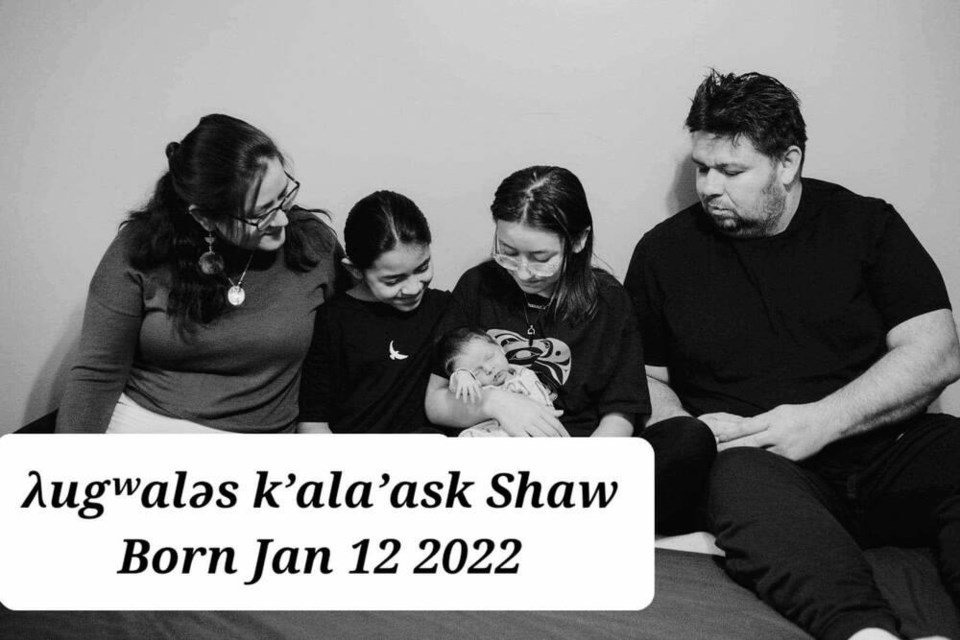A Campbell River couple is taking the Vital Statistics Agency to court 10 months after the province refused to register their child’s Indigenous first and second name using Kwakwala characters.
Raymond Taylor Shaw and Crystal A.J. Smith filed a petition in B.C. Supreme Court on Oct. 5, arguing they faced a “significant burden and emotional toll” when they felt forced, out of financial hardship, to register their son’s birth using only his last name in order to access benefits that are conditional on an approved birth registration.
Not being able to use characters that properly capture traditional names connected to their heritage and traditional lands “is unreasonable, imposes undue hardship, perpetuates colonial oppression and denies the holders of the right their preferred means of exercising it,” says the court document.
Shaw, a traditional native carver, is Liǧwiłdax̌w and a member of the Wei Wai Kum First Nation in Campbell River. His partner Smith, who is Ts’msyen and Haisla, was adopted into the Heiltsuk Nation.
The couple gave birth to their son Jan. 12 and named him λugʷaləs K’ala’ask Shaw. His name is in Kwakwala, the language of the Liǧwiłdax̌w people.
The child’s first name is pronounced Glu-gwa-lus, the name of a mountain in Raymond Shaw’s traditional territory near Sayward, and translates as “the place where people were blessed.” His second name, K’ala’ask, means “river” in Sm’algyax.
The Vital Statistics Agency only allows people to register names with Latin alphabetic letters, a standard set of French accents, apostrophes, hyphens and a period. Numbers, brackets, slashes and other symbols are not accepted.
In a March 3 letter, registrar Jack Shewchuk explained that while the agency is working with other business partners to add diacritic characters, “we are currently unable to accept your child’s name as you have proposed it.”
The Vital Statistics Agency in its letter noted other business partners would be unable to accept the signs or symbols or reproduce them onto secondary identification such as a driver’s licence or health care card. It suggested the parents register λugʷaləs’s name using another spelling, such as: Aug’walas or Augwalas. That was not an acceptable option for Smith: “If you change the spelling, you change the meaning.”
In the meantime, Smith was unable to get her child a health-care card and said she was forced to pay out of pocket for medical appointments and prescriptions.
The couple have named the registrar and the Vital Statistics Agency of B.C. as respondents in court documents.
The registrar and Health Ministry were not immediately available for comment.
The couple argue in court documents that the registrar was not entitled to refuse the registration of the baby’s name based on the inability of government systems to accept and reproduce the characters.
The petition says such a refusal violates the Charter of Rights and Freedoms related to freedom of expression and equality rights and the Constitution Act, 1982, regarding aboriginal and treaty rights and rights related to Indigenous languages.
Health Minister Adrian Dix told the Times Colonist in April the province wanted to see the system changed “and it will be soon.”
B.C.’s action plan to implement the United Nations Declaration on the Rights of Indigenous Peoples includes the adoption of a digital font that allows Indigenous languages to be included in official records.
Smith said in a previous interview it took her just five minutes to download the necessary font to spell her son’s name.
Court documents say it is important to Smith and Shaw that their son have a traditional name so that they can continue to reclaim and revitalize their languages.
Smith and Shaw said Thursday they are disappointed in the government’s lack of action given promises made to make changes. “Here we are nine months after λugʷaləs’ birth and he still isn’t recognized by this government,” said Smith.
>>> To comment on this article, write a letter to the editor: [email protected]



